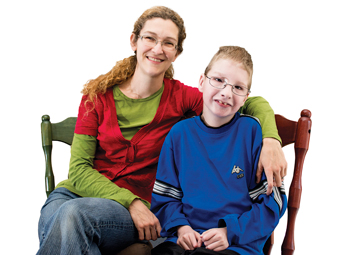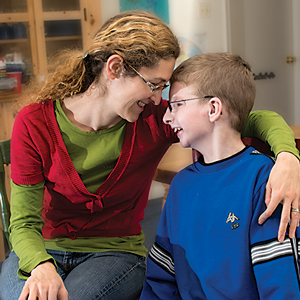The moment your child sees mine, he knows something is a little bit different – or a lot. It might be in the way my child moves, in his facial features, in the braces on his legs, or in the fact that he doesn’t speak. Ruben has special needs and there is no doubt about it. Except that your child probably does not know what that means, why it happens, or what to think about it all.
Recent census figures report one in five Americans has a disability of some kind. It might be a grandma in a wheelchair, a girl with autism who goes to your child’s school, or my son – who is diligently digging in the sand pit. I meet your son or daughter at Maymont as we struggle with the gigantic hill, pass each other at the door to the library, or push carts at the store.
 It almost always happens the same way. Your son asks, “Mom, what’s wrong with him?” and you are embarrassed and shush him. And we miss a beautiful opportunity to learn and to know. We miss each other. I am like any other mom. I love to talk about my children – their successes, and their struggles. And I understand that having never walked in my shoes, it’s hard to know where to even start.
It almost always happens the same way. Your son asks, “Mom, what’s wrong with him?” and you are embarrassed and shush him. And we miss a beautiful opportunity to learn and to know. We miss each other. I am like any other mom. I love to talk about my children – their successes, and their struggles. And I understand that having never walked in my shoes, it’s hard to know where to even start.
So here it is. Here’s where to start…
At Home: Prepare
Read! As your child sits in the safety of your presence, it’s a wonderful place to learn about people who are different from him. It gives him an opportunity to ask questions and for you to answer. Even when you respond with I don’t know, sometimes that’s just how people are born, or, We live in an imperfect world, and we all have things in our bodies that are not working well – it eases your child’s fears.
Our all-time favorite books are Leo the Late Bloomer by Robert Kraus which tells the story of a lion who isn’t able to do things as fast or early as other lions, and The Story of Ferdinand by Munro Leaf. Ferdinand is the Spanish bull who does not like to fight, but prefers to smell flowers. Almost any book can be used to explain that we humans have different talents or abilities. At the library, you’ll find books on specific disabilities, as well as biographies of famous people like Helen Keller, Louis Braille, or Christopher Reeve.
And watch! The Hunchback of Notre Dame, Finding Nemo, Dumbo, Tangled, Frozen, and so many others movies are about people or animals who might be different, but are still valuable.
On the Street: Investigate
When we meet, please don’t pull your child away. He is not embarrassing me or my son. I would much rather he ask and be friendly, than get the message that it’s better not to approach us. So when we are face to face and your son blurts out, “Why does he look so funny/weird/strange?” – rephrase the question for him. Teach your child how to ask in a polite way.
What’s the best opening? “Excuse me, can I please ask you a question?” Because I’m like you. Sometimes I love to chat, but sometimes I’m running late. We have great days and bad days. This gives me a way out on those not so good days and a beautiful way to connect on any other. I’m not hurt by curiosity; I’m not offended by a question from a 7-year-old that is not constructed in the proper way. I want to tell you about Ruben, that he does not talk, but uses American sign language to communicate. It is a pleasure to explain about his love of umbrellas and why he has “those funny shoes.” I don’t mind explaining how he is fed and that yes, he can write!
Making disability more normal is my pleasure, because I know that when your child meets someone else who uses a wheelchair, or might have autism or cerebral palsy, it will be easier, smoother, and more acceptable.
In the Car: Reevaluate
We are all curious creatures. We are interested in the new, the different, the strange. As adults we have access to information on disability and we have our experiences to draw from. Most of our children do not have either, but some do.
Ruben and I were walking down a staircase and Ruben walks slowly. He has to set both feet at every step. A girl of about eight was behind us, and as always I urged her to pass us. She politely refused, saying, “It’s okay. My brother has Down syndrome. I understand.” And that’s the world I want to live in. Where people are not scared of each other because of the lack of knowledge; where kids feel comfortable with others who look, or act differently; where a wheelchair is not an obstacle, but rather a platform for conversations. And who better than you to take the reigns of a discussion and lead your child into a greater understanding of the world he lives in.
So after you meet us, and you drive away, ask your curious child what he thought, if he had any questions, if he has met any other children with a disability. Children want to know, and we are here to provide answers, even when the answers aren’t easy.
Real Mom Ania Swanson lives with husband and two sons in Henrico. They love, among other things, sand pits, libraries, Richmond parks, and homeschooling.




